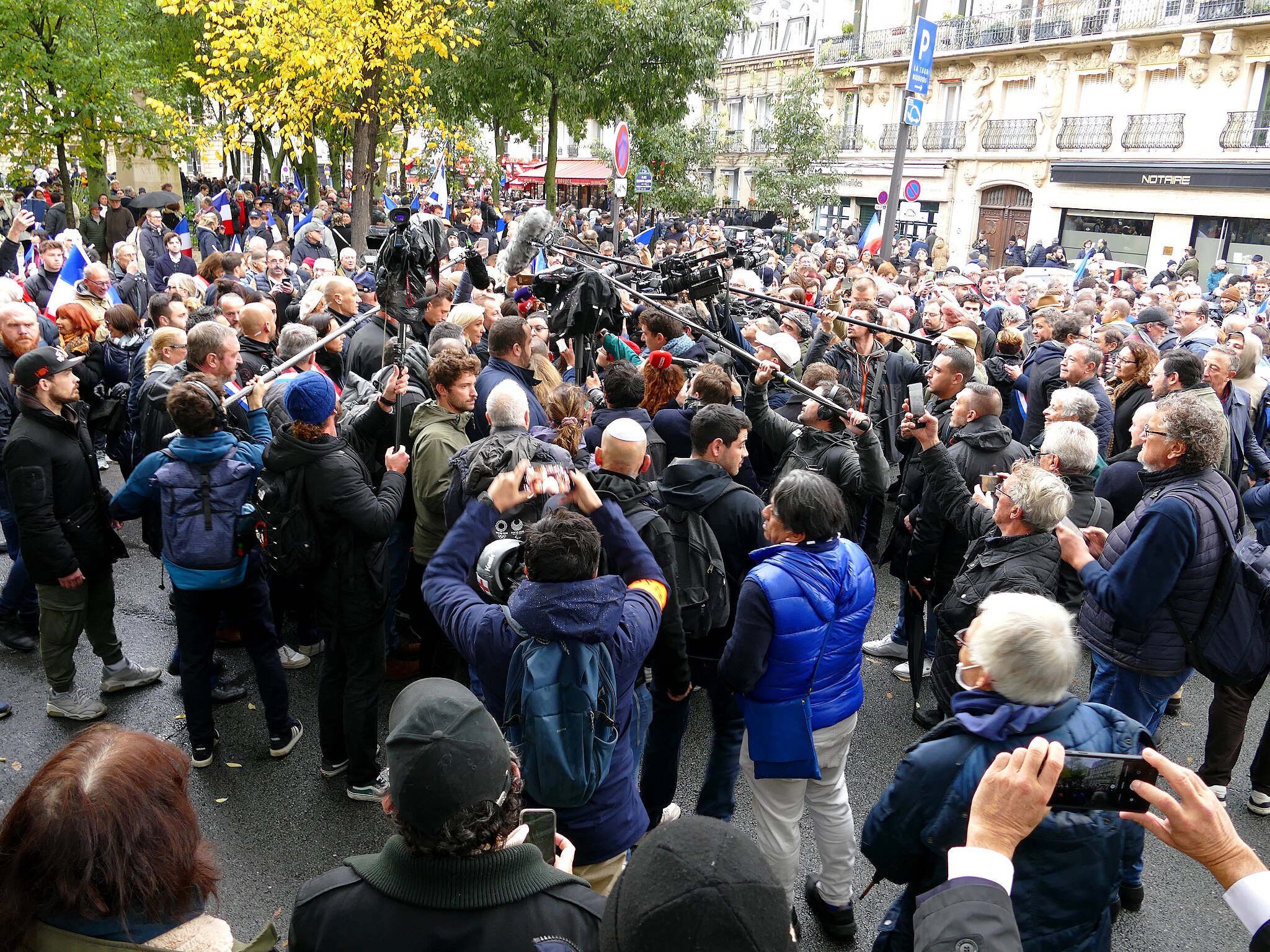The successful campaign of the Republican Front against the mainstreaming of the far-right proved that France’s ultra-conservative media, though on the ascendant, are still not hegemonic.
The media’s role in France’s recent parliamentary election campaign was more central than it had been on any previous occasion. For the first time, they acted not just as a channel or a stakeholder, but as a problem affecting the very functioning of democracy. This mainly had to do with the immediate context of the campaign, but also with ‘the structural transformation of the public sphere’ since the explosion of the internet and the political use of algorithms and social networks.1
These transformations, which have taken place worldwide, have been linked to the rise of ‘digital populists’2 (Trump, Bolsonaro, Salvini, the Brexiteers, etc.), who use social networks to spread their xenophobic nationalism and further the violent radicalization of public debate. New forms of expression, control and citizen action have arisen in response, although it is hard to know whether they will be able to counter the ongoing ‘fascization’ of political life driven by online hate.
We still have much to learn about the ambiguous nature of these transformations and their effects on the relationship between governments and the governed. They have helped to create unprecedented protest movements3 while also offering opportunities for public and private players to manipulate public opinion. The events of recent months have provided ample evidence of this ambiguity, which must be highlighted if we are to resist yielding to an overly pessimistic view of the public sphere.
Nevertheless, the balance is firmly tipped towards justified concern about the connection, clearer every day, between the increasing brutalization of the public sphere and the growth of far-right movements, which are stirred up by actors (including Russia) for whom they are a crucial weapon in their campaign to destabilize liberal democracies.4
Media empires in the service of the far right
The first reason for the centrality of the media in France’s recent parliamentary election campaign is what is generally known as the ‘Bolloré empire’. The far-right political agenda of this sprawling media complex has never been so blatant. Turn on CNews and there is and Pascal Praud, the far-right sports and news journalist; tune into Europe 1 and there is Cyril Hanouna, the radio presenter formerly a Macron ally and now a far-right sympathiser (and Pascal Praud); open Journal du dimanche – run by Geoffroy Lejeune, the former editor-in-chief of the far-right news weekly Valeurs actuelles (and regular guest on CNews) and produced by an editorial board that was ‘reshuffled’ and brought to heel after the mass resignation of the previous board – and there is the same kind of content (and Pascal Praud).
The Bolloré empire is not an isolated case. The billionaire entrepreneur Pierre-Édouard Stérin also openly spends significant sums on influencing public opinion in favour of the identitarian right and the fusion of the Right with the far right.5 Although his attempt to purchase the weekly magazine Marianne failed, Stérin has been active in other ways, setting up think tanks or training courses for managers and elected politicians.
On the agenda of these ultra-conservative, Catholic entrepreneurs is the ‘union of the Right’, a euphemism for the alliance of the right and the far right. Their project passed an important milestone when Éric Ciotti, then president of Les Républicains, said that his party would unite with the National Rally (RN) following the announcement of the dissolution of the National Assembly in June.
This kind of shift had long before been ‘called for’ in none other than Le Figaro, although not unanimously supported by its editorial board, some of whom cling to the Gaullist-Chiracist belief in an essential distinction between the republican right and the far right. But France’s biggest newspaper has welcomed op-eds from champions of the far right, including Ivan Rioufol, also a commentator on CNews, and Éric Zemmour, the far-right pundit and presidential candidate in 2022. Other contributors at Le Figaro include Eugénie Bastié, the new face of the campaign to ‘de-demonize’ the RN and mock antifascism as outdated and uncool, and Luc Ferry, the former minister of education responsible for the 2004 ban on the headscarf in schools, who cheerfully declared in the paper that ‘better RN than New Popular Front’.6
The dismantling of the public news service
Another reason for the media’s central role in the campaign was an element of the RN’s manifesto that only took on full significance when an RN victory stopped being improbable and started being predicted by the polls as the most likely outcome: the dismantling of the public news service.
Of course, the existence of a public news service is a relatively recent aspect of democratic life, enshrined by the Council of Europe in the notion of ‘public service media’. Its origins in France can be traced back to the 1920s and 1930s, when it became clear that media ownership by capitalist groups was distorting the principles of pluralism and respect for facts, but also the values of equality and solidarity espoused by republican institutions. The role of the ‘gutter press’ in the Dreyfus affair was illuminating in this respect,7 while the responsibility of the ultranationalist press, often owned by arms dealers, for the outbreak of the First World War was analysed at an early date by the Austrian pamphleteer Karl Kraus.8
Kraus cautioned against the hasty attribution of the ‘free press’ label to a press that was, while not state-owned, nevertheless dependent on economic power. If a state monopoly on the media was a clear violation of the principles of freedom of expression and information, a lack of economically independent media was the symmetrical danger. Indeed, one of the current obsessions of the European far right is the idea that when public service media restate republican principles (equality of citizens, fraternity), recall nineteenth-century history, or point out the persistent racism of far-right movements, they are insidiously serving the Left.9
The counterattackx
Just as the prospect of an RN victory sparked a surge among leftwing parties, leading to the formation of the New Popular Front (NFP), it also led to a flurry of activity in the left and centre-left media. Numerous warnings were expressed by intellectuals, researchers, academics, arts professionals, charitable organizations and human rights groups. But amidst the furore about the Bolloré empire, the Left lost sight of the fact that it is just one component of the public sphere, which still has room for diversity and conflict. Other elements of the public sphere launched an all-out counterattack against the Bolloré group’s accelerated efforts to ‘respectabilize’ the RN.
The counterattack focused particularly on the false parallel between RN and France Unbowed (LFI) drawn by numerous opinion columns and editorials across the rightwing media and political sphere. This included a sizeable portion of the Macronian centre right, as well as the ‘neo-republican’ ideological space. Yet the attempt failed to destroy the idea of a republican front by discrediting the New Popular Front. Victory ultimately went to the appeals, opinion pieces and studies that drew attention to the RN’s origins (many of its founders were committed collaborationists and former SS members), the far right’s track record in power, and the many divergences between its manifesto and the republican tradition.
Of course, the effect of these historical reminders and articles should not be overstated; after all, they were unable to reach the RN’s core voters, who are statistically likely to be poorly educated and not to read this kind of content. Nevertheless, their frequency gave the impression of a collective awakening that restored credibility to the demand for a republican front, which has so often been mocked, pulled apart and hijacked, including by ‘neo-republican’ groups declaring ‘neither RN nor LFI’ or even ‘neither RN nor NFP’. This may have played a role in the third-place finish of the RN in the second round, well behind the absolute majority that RN president Jordan Bardella believed had been within reach.
One striking aspect of the electoral campaign in the media was the pervasiveness of the topic of antisemitism, which cannot be dismissed as the result of a campaign to make the RN more respectable and the LFI extremist. The rise in antisemitic behaviour and incidents is well documented. There has been a shift from legitimate denunciation of the Netanyahu government and Israeli war crimes in Gaza to questioning the very existence of the state of Israel, which is equated with a colony. The ‘global Jewish conspiracy’ theory according to which every state in the world is ‘in the service of’ the Jews has also seen a revival. This shift has taken euphemistic forms in leftwing circles and it is essential to be vigilant on this point.
Nevertheless, the strategic use of antisemitism accusations during the campaign was undeniable, and was denounced as such by numerous organizations working to combat racism and antisemitism, as well as by prominent Jewish figures and groups. This kind of manipulation of the public sphere was vividly illustrated by the revelation that those responsible for painting bloody hands on Holocaust memorials in Paris were acting on the Kremlin’s orders. Beside the fact that the escalation of the Israel-Palestine conflict creates an impression of ‘double standards’ when it comes to condemning Russia’s attacks against civilians, the destruction of medical or cultural infrastructure and other violations of international law in Ukraine,10 the spiral of extremist violence also has a strong potential to destabilize and fracture the public sphere in western democracies.

The internet as an arena of ideological capture
Moving away from the immediate context of the campaign, we might ask what it revealed about the transformation of the democratic public sphere and its survival in connection with other recent trends in mass political communication.
Of course, there has never been a ‘pure’ public sphere in the sense of perfect ‘communication oriented towards agreement’, as Jürgen Habermas admitted. Starting in the eighteenth century, this ideal was constructed as a space free from censorship, authoritative discourse and insults; a space that encouraged the free exchange of views and would help public opinion to shape itself. But it has always been plagued and ‘warped’ by vested interests, the effects of domination, and inequality of access to public expression, all of which keep it from its goal of shaping the collective will and autonomy of citizens – particularly, as Habermas pointed out in 1962, under the influence of the large conglomerates that dominate the media in the capitalist world.
In that sense, the ‘structural transformations’ brought about by the internet and social media have not created something totally new, but rather intensified certain tendencies towards rhetorical brutality, polemic and insult. These already existed in the public sphere of the eighteenth century, which was rife with defamatory caricatures and conspiracy theories11 (although sometimes retrospectively idealized, as if Voltaire and Kant were its most representative voices). Back then, such caricatures and theories were the correlate of criticism, indispensable to the proper functioning of a democracy. These days, however, criticism can go rogue, aiming not to denounce abuses of power, but to exacerbate tensions around topics such as immigration, asylum and the place of Islam in the West.
At some point something must give. The goal in this case is to stir up a ‘racial civil war’ so as to ‘legitimize’ an authoritarian, far-right government. In the United Kingdom, racist riots flared in the summer after the fatal stabbing of three young girls was attributed to a Muslim asylum seeker (later discovered to be disinformation). The violence was the most recent manifestation of an ‘international of hatred’ fuelled by neo-Nazi accounts and pro-Trump activists. Tommy Robinson, the founder of the English Defence League, posted a video of the rioting on social media, prompting Elon Musk to declare that ‘civil war is inevitable’. This poison is disseminated primarily through Telegram and Elon Musk’s X, which supports Trump and is deregulating forms of online hate prevention.12
By using the religion (often hastily or incorrectly deduced) of a person implicated in a rape or murder case to justify the claim that the religion itself is dangerous, or by crediting imaginary groups with the power to control world affairs, these hate campaigns undermine the basic ‘friendship’ between citizens that Aristotle saw as the prerequisite for the polis. In its place, they paint a picture of absolute fault lines that can be bridged only by violent forms of politics.
But here, too, France’s recent election campaign was testament to the ambiguity and diversity of the internet’s uses. The popularity of a depoliticized Jordan Bardella on TikTok is counterbalanced by the online exposure of open racism and homophobia in several RN candidates’ tweets, posts and other semi-public statements. The news sites Blast and Mediapart and investigations by Libération have meticulously exposed what the RN has been trying to conceal in its attempt to become respectable and appeal to younger voters: the enduring racism and xenophobia that underly the identity of Le Pen’s party.
But can we rely on the ‘reassuring’ image of a public sphere characterized by conflicts and divergences – one that seems to meet the requirements of democratic pluralism, one that may be affected by new manipulation techniques, but one that is sufficiently robust to counter them with investigations (John Dewey’s great hope13), logical arguments and re-established facts?
A more radically disturbing question would be to ask whether the very idea of a public sphere for the exchange and confrontation of opinions, interests, social demands and emotions still bears any relationship to reality. Numerous studies on the formation of isolated information ‘bubbles’, where worldviews are disconnected from alternatives and become self-confirming, and where one group’s information is another group’s fake news, have transformed the utopia of ‘digital democracy’ into a dystopia.14 Is this the end of the democratic public sphere, one fragmented into radically hostile ‘camps’ that no longer speak a common language?
Again, however, it would be premature to do away with the regulative idea of a democratic public sphere. The idea, which can be traced back to the Enlightenment, played a part in the construction of liberal democracy. To abandon it would amount to a capitulation, handing victory to contemporary authoritarianism. The very fact that citizens who hardly know each other, if at all, still engage in online discussions, despite all kinds of biases, bad faith and multiple forms of intimidation and interference, attests to the importance they still attach to exchange and persuasion, or to the search for the best argument. In this respect, the invocation by both sides of the ‘truth’ continues the tendency of ordinary language to try and agree on the facts.15
The end of the neoliberal era: Alternative narratives and suggestions
It is not uncommon these days to find that opposition to ‘traditional’ media actually conceals an opposition to all the components of liberal society, including the parts of the media that remain anti-racist, non-xenophobic and non-hostile to sexual minorities.16 The description of a public sphere entirely dominated by falsehood that must be shunned in favour of a parallel universe, a place of hidden truth and ‘reinformation’, often goes hand in hand with depictions of a latent civil war that must be made into a reality. The assault on the Capitol by fanatical Trump supporters is an example of this apocalyptic worldview, which is echoed by various websites in the identitarian constellation, but also, balancing precariously between far right and far left, by some of the websites created in the wake of the gilets jaunes movement and in the work of certain activists calling for insurrection and the return of the guillotine.
First, we must acknowledge that a kind of consensus among ‘centrist’ media may have aggravated democratic disenfranchisement and social contempt on the part of an overly homogeneous journalistic and political world.17 Comparisons can be made to another campaign: the one around the adoption by referendum of the European Constitution,18 whose opponents were casually described as ‘national socialists’ by the editor-in-chief of the leftwing Libération.
The neoliberal turn of the European project, the elevation of ‘free and undistorted competition’ to the status of an imperative watched over by a dedicated commission, the encouragement of competition in all areas of public service provision, and the imposition of rules limiting public deficits, all contributed to the inversion identified by Foucault as the heart of neoliberalism: the shift from state surveillance of the market to a state in the active service of the market19 and the construction of a ‘democracy of consumers’.20
This shift, and everything associated with it in terms of socialist parties’ acceptance of a market logic only marginally modified by social security schemes, went almost unquestioned in media outlets aligned with the centre right and centre left, which were instead tempted to demonize anything that might resemble economic dirigisme or protectionism. Nevertheless, there are numerous indications that we are now living at the end of this major neoliberal cycle.
The ambiguous results of the parliamentary elections have not made it any easier or less urgent to reconstruct an alternative to neoliberalism that counters racist nationalism and redeploys a Left capable of regaining the trust of voters with the least financial and cultural capital. A crucial element of this undertaking will be providing economic answers to the withdrawal of public services across France, to feelings and experiences of abandonment by the authorities, to the increasing precarity of work, to urban relegation, and to everything that encourages a ‘negative individualism’, with everyone forced to rely solely on their personal ‘capital’ and deprived of ‘support.’21
But it may also require work to reinterpret certain patterns, to spot poles of identification that could be given a completely different meaning to that ascribed by ‘identitarian’ paranoia. In that respect, the work of the artists and intellectuals who designed the Olympic Games opening ceremony was a defence and a successful illustration of an open nation: a celebration that was simultaneously ‘Francophile’ and inclusive, a colourful combination of classical repertoire with street dance, miles away from the blend of nostalgia and hatred of the present with which the ‘reactionary’ movement – which of course immediately erupted into vitriol against it – tries to define ‘the French spirit’.
Similarly, on another level, the reactionary idealization of the patriarchal family must not prevent reflection on the value of the family as an experience of sociability that cannot be reduced to other bonds. Although feminist thought has made it necessary to rethink this experience and identify its poles of violence, the cardinal importance of the family in the lives of millions of individuals cannot be denied. In this context, it is striking that other European countries like Germany have much more advanced family assistance policies than France (particularly for the first child, for which there is almost no support here), with a parental allowance (Elterngeld) of around 65 percent of pre-birth income paid for up to fourteen months after birth. The huge take-up of the Elterngeld among German fathers can help to assuage the fear that a ‘natalist’ policy could have the effect, or even intention, of confining women to the household and slowing the progress of gender equality.22
These are just two pointers, two examples of measures that do not simply reaffirm republican principles but offer a counternarrative to the conservative vision of the nation, and a one-off policy that could make the lives of couples and families easier and combat the disaffiliation and increasing precarity that are tearing at the fabric of society.

Published in cooperation with CAIRN International Edition, translated and edited by Cadenza Academic Translations.
Jürgen Habermas, A New Structural Transformation of the Public Sphere and Deliberative Politics, trans. Ciaran Cronin (Polity, 2023).
Jamie Bartlett, Jonathan Birdwell, and Mark Littler, The New Face of Digital Populism (Demos, 2011).
For a discussion of some of these transnational movements, see my book L’Art de ne pas être trop gouverné. Sur les crises de gouvernementalité (Seuil, 2019).
Artificial intelligence (AI) is now used by the Russian disinformation services to produce content targeting European governments that support Ukraine. See in particular Recorded Future, ‘Une nouvelle campagne de désinformation russe majeure utilise l’IA générative pour ‘plagier et militariser’ le contenu des organes de presse et ainsi influencer les électeurs occidentaux,’ Global Security Mag (May 2024).
Clément Guillou, ‘Le plan du milliardaire Pierre-Édouard Stérin pour ‘permettre la victoire’ de la droite et de l’extrême droite,’ Le Monde, July 21, 2024. The ‘Pericles plan’ outlined by several newspapers stipulates the allocation of 150 million euros to ‘influence public opinion,’ increase the National Rally’s chance of victory by winning over the traditional right, train candidates for elections, etc.
Luc Ferry, ‘Le pire serait une victoire du Nouveau Front Populaire!’ Le Figaro, June 20, 2024.
See Christophe Charle, Le Siècle de la presse (1830–1939) (Seuil, 2004). Heavily anti-Dreyfus at first, the press split into two factions following the intervention of pro-Dreyfus intellectuals. Le Figaro, which had initially accepted Zola’s J’Accuse, soon retracted the article so as not to offend its anti-Semitic readers.
According to Jacques Bouveresse, ‘Kraus was not far from thinking that it was, almost literally, the ‘press government’ that had desired and decided on the war.’ Bouveresse, Satire et prophétie: les voix de Karl Kraus (Agone, 2007), 97.
Marine Le Pen denounced ‘Envoyé special’ as ‘a highly politicized, far-left programme’ following the broadcast of a documentary report about racism among RN supporters.
Cyrille Bret, ‘Le conflit au Proche-Orient tombe à pic pour la Russie,’ Slate, November 6, 2023.
See Antoine Lilti, ‘Vies privées, espace public,’ in L’Héritage des Lumières. Ambivalences de la modernité (EHESS/Gallimard/Seuil, 2019), 167–196.
Damien Leloup, ‘Émeutes au Royaume-Uni: sur les réseaux sociaux, l’extrême droite attise la haine,’ Le Monde, August 7, 2024.
See John Dewey, The Public and Its Problems (Holt, 1927).
See Charles Girard, ‘Quel espace public pour Internet?’ Esprit, November 2021.
Jürgen Habermas, ‘Political Communication in Media Society: Does Democracy Still Enjoy an Epistemic Dimension? The Impact of Normative Theory on Empirical Research,’ Communication Theory 16, no. 4 (2006): 411–26.
I discussed the possible return of criticism of the media in an interview in 2019: ‘S’opposer aux médias est devenu un argument électoral,’ Le Monde, April 3, 2019.
This social homogeneity was the starting point for Pierre Bourdieu’s relatively ‘impressionistic’ critique, On Television, trans. Priscilla Parkhurst Ferguson (The New Press, 1996). On the limitations of this work in terms of the sociology of journalism, see Jean-Louis Fabiani, Emmanuel Ethis, and Emmanuel Pedler, ‘À propos de Sur la télévision de Pierre Bourdieu,’ Revue européenne des sciences sociales 35, no 109 (1997): 167–70.
‘10 ans après, retour sur le traitement médiatique du référendum sur le TCE,’ Acrimed, May 29, 2015.
Michel Foucault, The Birth of Biopolitics: Lectures at the Collège de France, 1978–1979, trans. Graham Burchell (Palgrave Macmillan, 2008), 116.
On the idea of a ‘democracy of consumers’ and the way the European Union has gradually adopted an ordoliberal agenda, see Aliénor Ballangé, Le Démocratie Communautaire. Généalogie critique de l’Union européenne (Éditions de la Sorbonne, 2022).
Robert Castel’s analysis of ‘disaffiliation,’ the rise of ‘negative individualism,’ and the need for social ‘support’ as the foundation for a more substantial freedom remain as relevant as ever. See Robert Castel, L’Insécurité sociale. Qu’est-ce qu’être protégé? (La République des idées/Seuil, 2003).
‘Allemagne. Le congé parental de plus en plus populaire chez les pères,’ Courrier international, July 12, 2017.
Published 9 October 2024
Original in French
Translated by
Cadenza Academic Translations, Isabelle Chaize
First published by Esprit 9/2024 (French version); Eurozine (English version)
Contributed by Esprit © Jean-Claude Monod / Esprit / Eurozine
PDF/PRINTPublished in
In collaboration with
Newsletter
Subscribe to know what’s worth thinking about.
Related Articles

Afraid of falling behind, businesses are rushing to implement AI – even if their industries might not be ready for it. In this Standard Time episode, we explore generative AI’s impact on media and journalism, and ask whether its making us smarter or dumber.

As propagandists of a patriarchal order, tradwives perpetrate harm. But harm is being enacted on tradwives too. So why do some feminists see tradwifery as self-empowerment?





